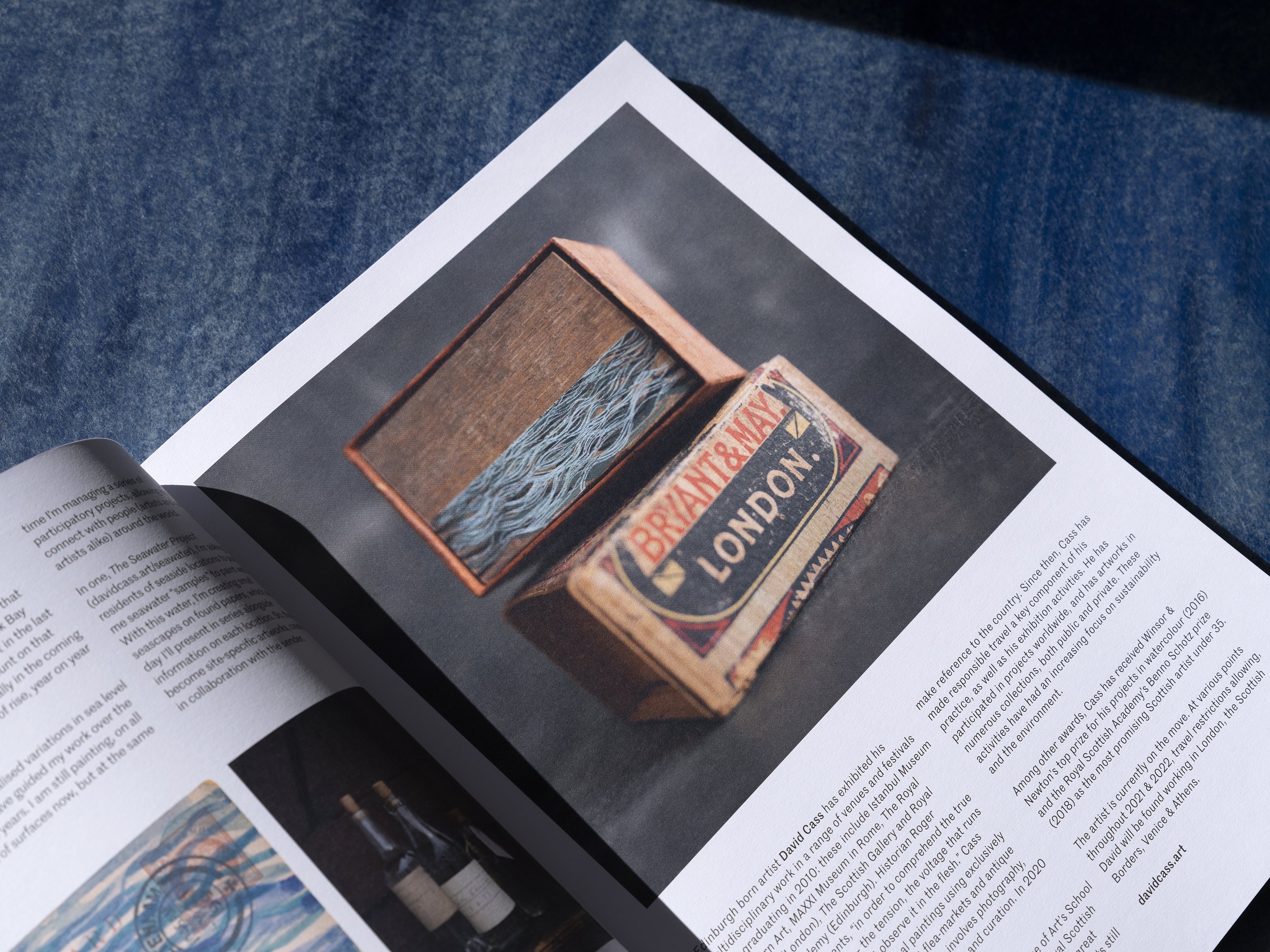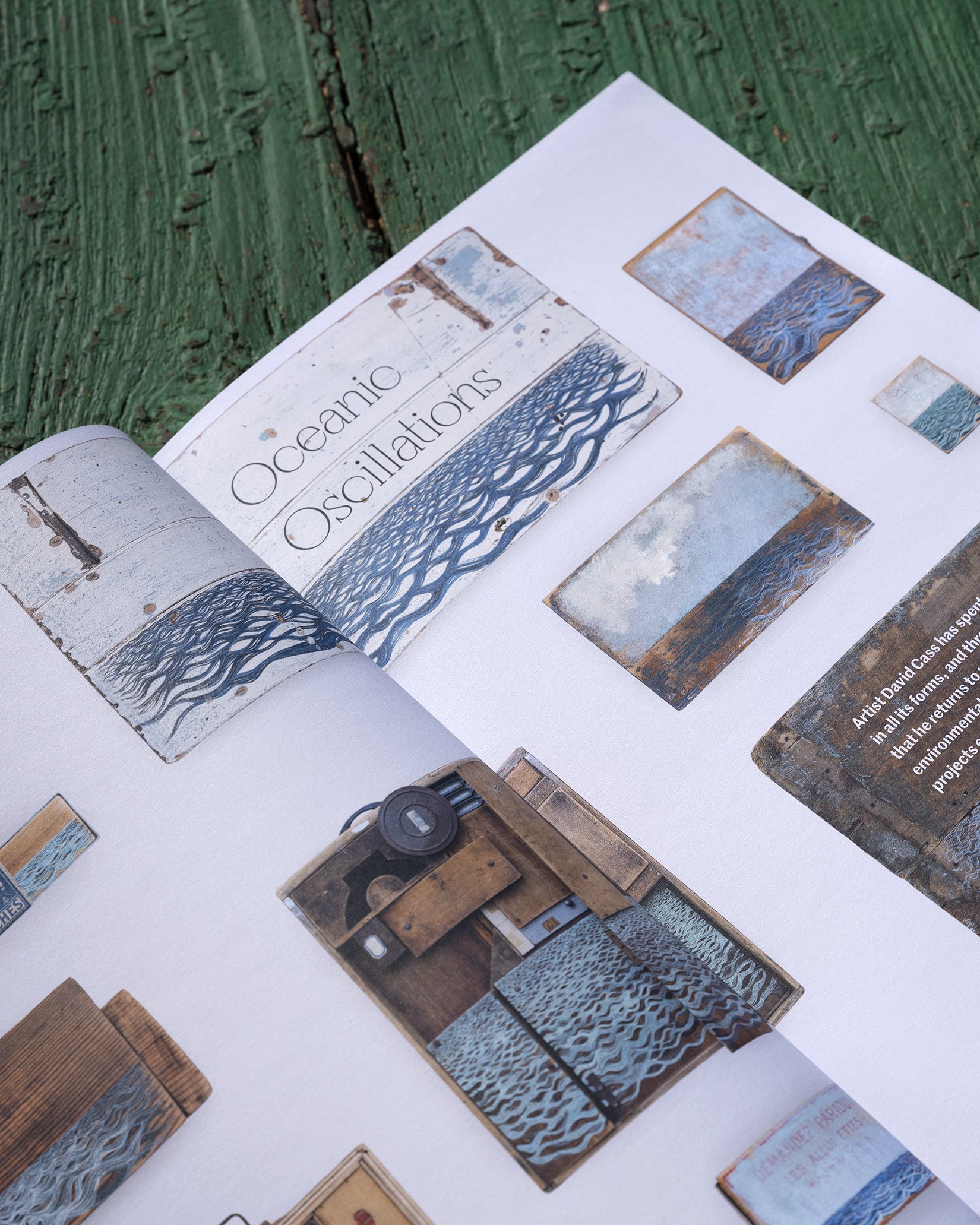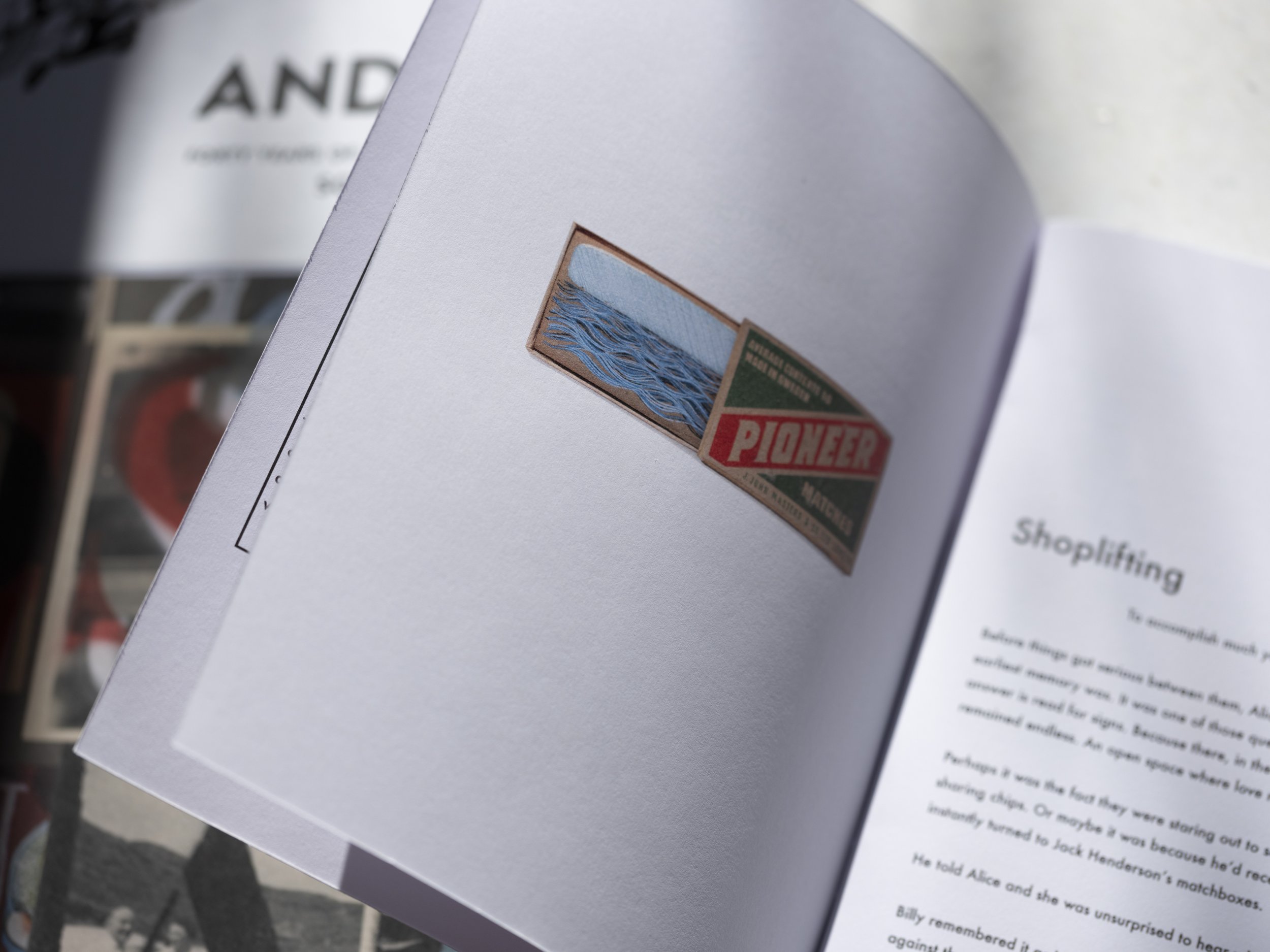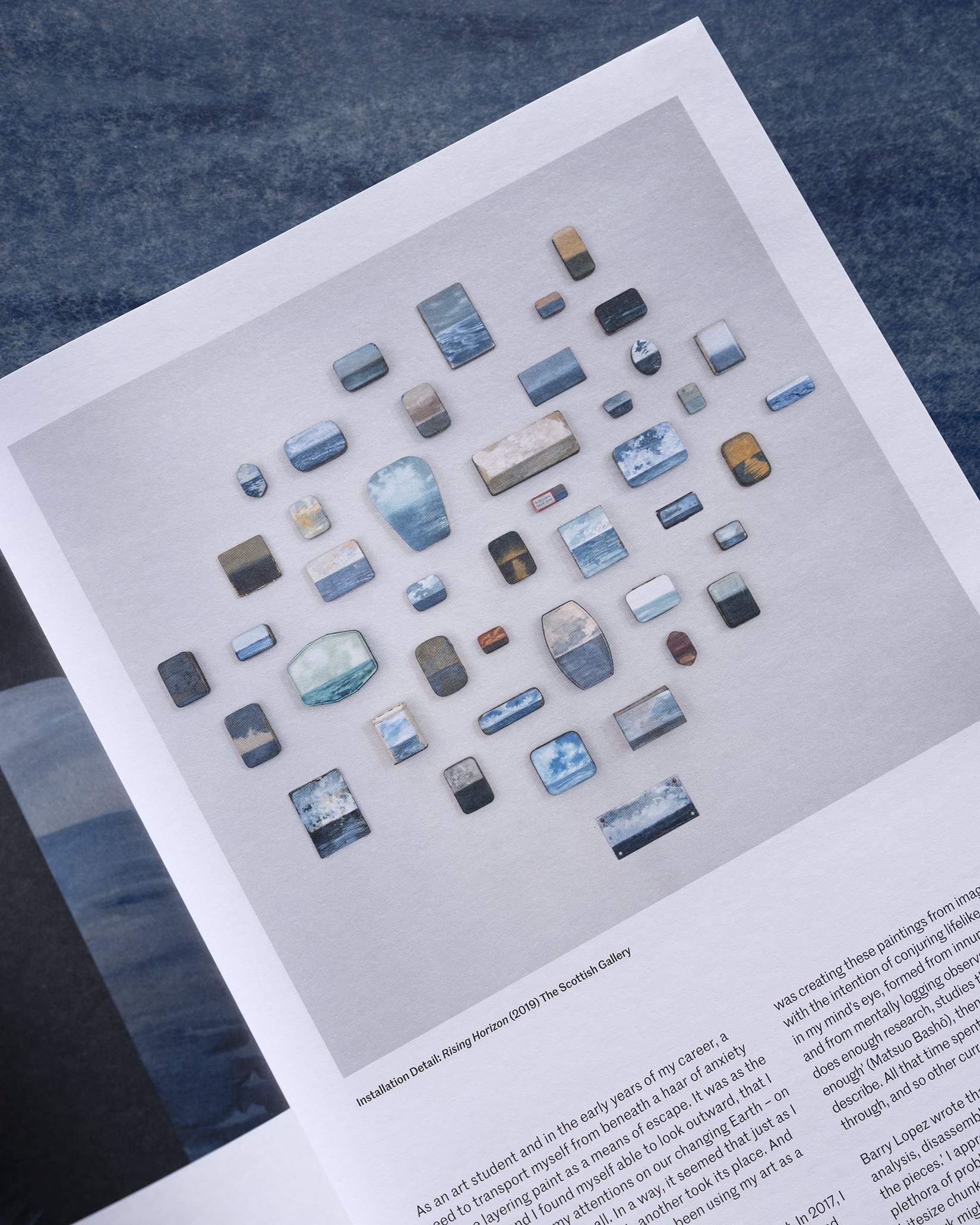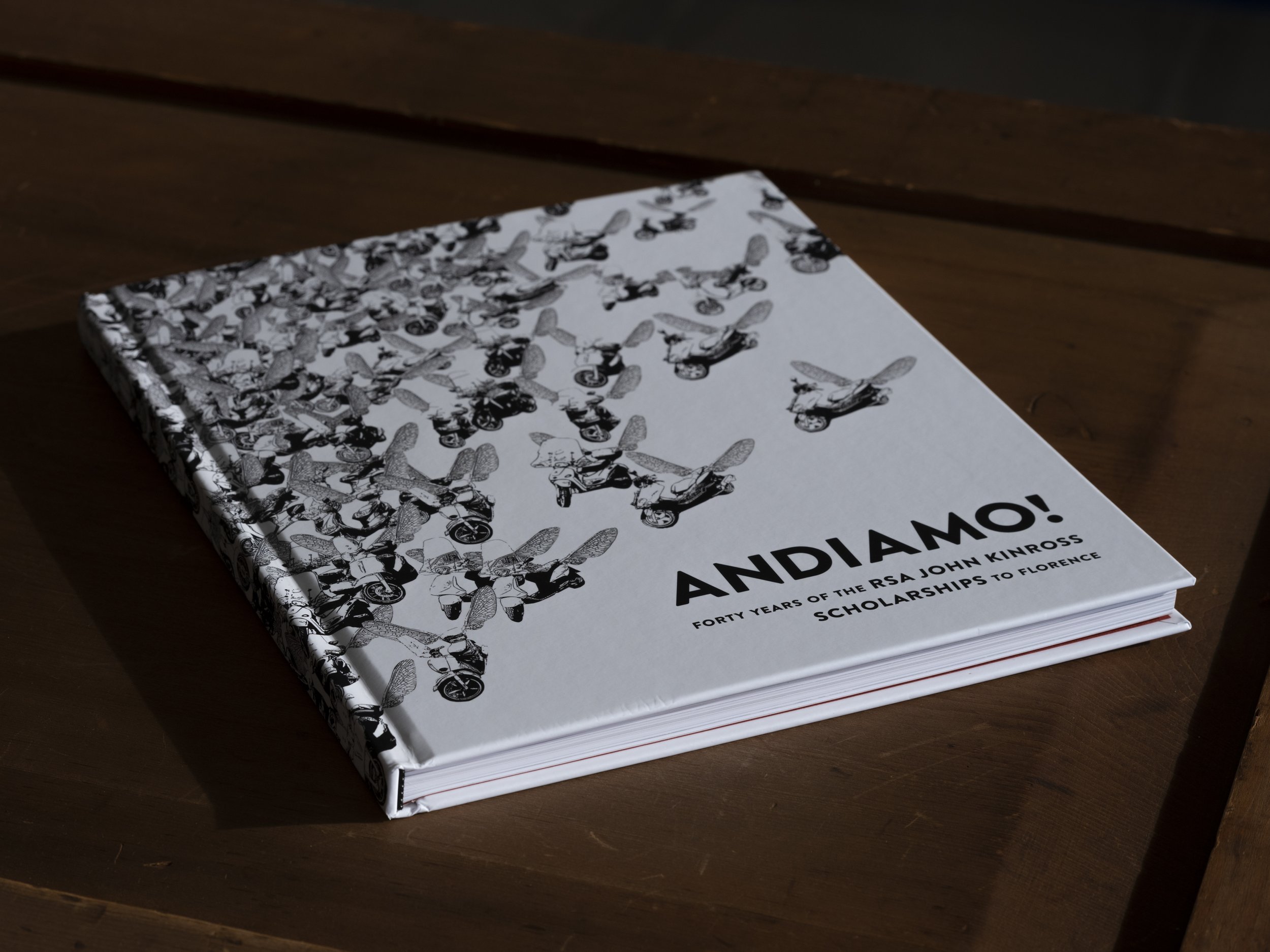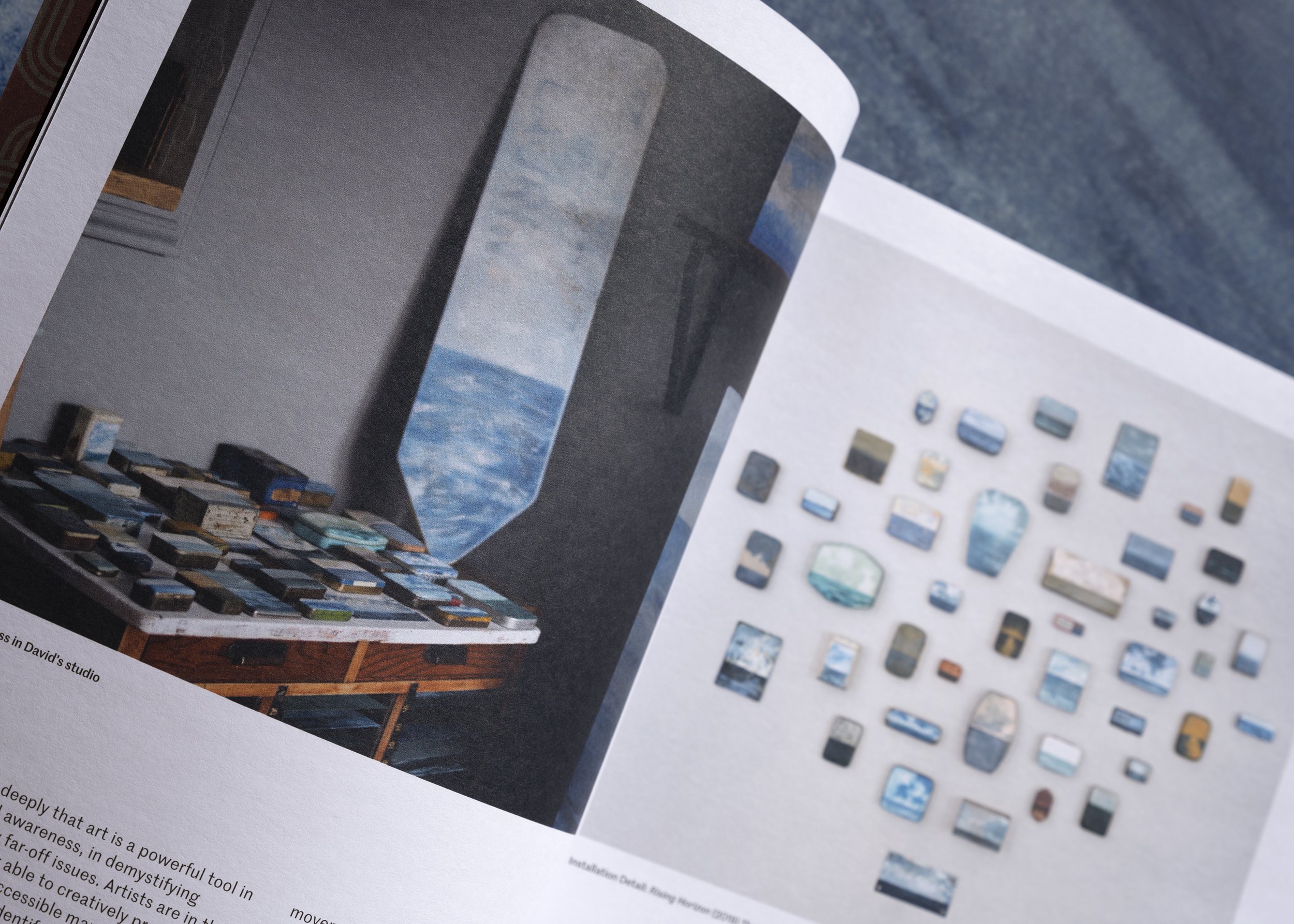Selected Commentary
“Cass has long concerned himself with climate change ... he continues to wrestle with these era-defining issues. His atmospheric seascapes are painted onto found objects, many of them antiques, and these aged former containers, books and other objects remind the viewer of a time when humans had yet to have such a significant impact on the natural world.”
“I’ve often thought that somebody somewhere should curate an all-singing, all-dancing, centuries-spanning exhibition of Scottish sea art. Unsurprisingly for a nation with an 11,000-mile coastline, one where the nearest saltwater is never all that far away, the sea has tended to feature prominently in the work of many of our best-loved artists, from Alexander Nasmyth to William McTaggart, the Colourists, Joan Eardley, John Bellany, Ian Hamilton Finlay, Will Maclean, James Morrison, Frances Walker, Reinhard Behrens, Beth Robertson-Fiddes, David Cass…”
“There is a strong sense of nostalgia running through his work, and the viewer is invited to meditate on the transience or passage of life … The contemporary is constantly being constructed on the foundations of the old, eclipsing but still acknowledging that which has gone before, preparing the way for renewal through reinvention and reconstitution...
Simultaneously a painting and a sculpture, brisk strokes of gouache in delicate shades [of blue] eloquently suggest the eternal motion of the rippled water stretching towards the precise line of the horizon … The works on show in Unearthed create a layered language of material, form and concept and they veer between realism and abstraction, demonstrating Cass’s skill and versatility as an artist … Cass carefully selects colours for his palette that harmonize beautifully, which contributes greatly to the overall appeal of his creative offering.”
“David Cass’s ‘Years of Dust and Dry’ [painting] skilfully utilises the found object as the textural ground for painterly and sculptural exploration of a collective human mark. The recurrent motif of a stylised ocean, a rhythmic swell of flattened greenish grey gouache painted on a farmhouse table top, combines the natural effects of time, life and decay with human design and deliberation. Weathered by time and domestic use the bulk of the table top, resting on two small open drawers, is overlaid by an expansive pattern of water. Cass extends this motif in the surface treatment, diminishing the circumference pattern at the edges to seemingly create an expanded world of unconscious aspiration contained in this mass of water, the wood beneath creating imaginative depth in contrast.
It is a poetic image echoed in miniature in a collection of matchboxes and wooden coffee grinder drawers an adjacent cabinet, bone dry elements juxtaposed with an infinite expanse of water. There is something aged about the choice of colour, reminiscent of folk painting and this combined with an almost sculptural quality to the wave pattern gives the work a feeling of connection to generations past, together with a feeling of eternal longing that reaches deep beneath the distressed wooden surface. Cass’s paper film reels and projector are equally intriguing, a dialogue between object and invention; a museum piece coupled with celluloid in a form that cannot illuminate itself. Cass presents a compelling sequence of thought about the mystery of life, knowing and the human condition.”
“David Cass is most definitely an artist worthy of investment. His artworks are gaining significant recognition, yet he remains an affordable & accessible creative talent.”
“And so David’s art is – an elegant, organic fusion of found objects and his own artistic application. A matchbox, which when opened sports a miniature painting. Flea-market found aging postcards – snippets of lives lost – artfully arranged and incorporated into an understated, emotionally authoritative setting. And seascapes. Great glorious seascapes adorning desktops, tabletops, doors…
This care that David has for his immediate, and broader, environment is encapsulated in his art. Although it is not his explicit intention, a profound sensitivity towards the world around him is conveyed, and it is perhaps this, above all else, that gives his work such an unmistakably restorative quality. As he says himself: “I’ve taken somebody’s leftovers and given them new life.” In so doing he takes and renews forgotten and forlorn aspects within each one of us.”
“Water is central to David Cass’ art – it has been a focus ever since he left Edinburgh College of Art in 2010, as has his interest in painting on found objects. His most recent body of work, ‘Rising Horizon’, develops this productive vein in a continuing exploration of climate change – and the implication of all its devastating effects - as seen through rising sea levels. Here, on plastic food packaging, advertisement signs, pill tins, hook-on racing car numbers, old paint tins, he paints his seascapes, things of beauty in themselves, celebratory, but also more subtly exploring the terrifying fallout of the Anthropocene.
Cass has worked with themes of inundation and destruction for many years, creating paintings, sculptural pieces and overpaintings that imagine inundation on a vast scale, not least in his studies of Venice and Florence. There is something of the miniaturist in Cass’ work, a focusing in on the detail, no matter what the scale – and that scale ranges from the very small to the very large. He finds his objects at flea markets, salvage yards, antique fairs.
The reformed plastic and metal objects which he uses in this exhibition are a new departure for an artist who has made much of his previous work of, on and from found wood. Sometimes the recycling is not only in the use of the material as a surface upon which to paint, but a reuse of the object itself, as with his use of the oil paints in a 100 year old artist’s box, to paint on its deconstructed exterior. The links with his theme are telling.”
“Cass’ thoughtful and moving pieces are all the more powerful in that they are made by someone who was not yet born when the flood waters hit Florence.”
“Cass captures a hint of the desperation of Venice’s rapidly shrinking population trying to carry on their lives between the twin flood tides of tourism and the overflowing Lagoon. In other paintings, however, he looks down from the collage of the walls to the place where they meet the water, but this is not in a sharp dividing line.
Venice is a city of reflections and so if you look at the walls you see the reflected light from the water and if you look at the water you see the reflected walls. Thus his art becomes a metaphor for the unstable balance of fragility and permanence that is one of the world’s most beautiful cities.”
“Without exception, each of David Cass’ artworks describe water in some way. From straight depiction of seas or pools to exploration of environmental extremes in drought and inundation.
[Many recent] works present the issues of modern day Venice in the face of rising sea levels and mass tourism. He is also creating artworks set in the Almería province of Spain: the first location in Europe to witness desertification.
The exchange between wet and dry sits foremost in Cass’ work: not only in these ecologically conscious projects, but also in his choice of materials — mostly watercolour paints applied to antique surfaces sourced throughout Europe.”
“Cass is a citizen of the world who can be at home wherever there is water, weakening memory and wood (or any other surface the artist may paint upon).”
“David Cass uses found wood to make beautiful constructions, but even more strikingly to cut and paint surfaces as though for woodblock printing.”
“These fragments of beauty are observations of the mundane, they paint a picture of time passing, and of the multi-layered past that is Venice’s history, the aesthetic quality of each painting, a subject worthy in itself.”
“My experience at the Venice Biennale is that it is often the fortuitous detour, aka me getting lost like I inevitably do, that is going to take you to the most unexpected rewards. This is how I came across David Cass’ installation near the Giardini.
David’s work is about the rise of sea levels, an issue Venice knows all too well. The idea behind ‘Where Once the Waters’ is to raise awareness about the variation in sea level in the place nearest our birthplace since we were born. David asked people to submit their data on his website and then typed the results provided by oceanographic organisations across the world on some 600 personally addressed letters he never sent – they are all posted on a wall here. On the opposite wall, a collection of painted everyday objects like small tin boxes of different shapes where David explores the theme of the sea and shifting horizons ... I realised there was something profoundly moving, almost poetic, behind the care and the time devoted to the design and completion of this installation. I could picture David sat before his typewriter writing to strangers around the globe, no two letters the same, delivering alarming data in a way that is both matter-of-factly and intimate, and I just knew his concern for this issue is genuine. ”
“David Cass’s seascape, made from a piece of recycled timber, is not so far from Bill Bollinger’s minimal drawings, but with a richer sense of the object.”
“With each new project, Cass’ exploration into environmental themes deepens ... ‘Rising Horizon’ in February 2019 made reference to sea rise, and was a direct step on from his previous solo exhibition ‘Pelàda’: zooming out from close examinations of Venice and its rising lagoon, to describe the abstract notion of a universal rising horizon line.”
“It’s as if Cass is trying to single handedly etch the permanence of the earth onto the broken fragments he collects.”
“His is a deceptively simple style, a little like Lowry at times... These are the kind of works which will continue to offer something to the viewer on repeated viewings...”
“David Cass has an innate understanding of matière; a sensitivity to material, it’s texture, tone, pigment, weight and beyond this its context, history and emotional resonance. He works with found objects and by an act of appropriation and minimal intervention – perhaps merely turning the front of a drawer through ninety degrees – he creates works of art with quiet authority. The first act in the creative process is therefore to search (most recently long days spent in the flea markets of Brussels where printers trays and old, handwritten envelopes suggest themselves as his canvas). From the accumulation of material in his studio ideas for a seascape emerge from the grain of a wooden tray or a collection of matchboxes, placed and painted; pinned in permanent, significant order belying their ordinary journeys.”
“It should not escape our notice here that the assembled trays on which Cass has painted seem, in some way, to be informed by the Northern Romantic tradition in painting; I would hate to overdo this particular reference, but many of them appear (perhaps fortuitously – perhaps not) to reference the stylistic handling of some of northern Europe’s finest painters – from Nolde and Munch, to early Mondrian and more recently Gerhard Richter. Brought together in this way, they represent a coherent body of work in their own right, for sure, but they also offer us a means to meditate upon our changing relationship with our world – a relationship that is shifting as our impact upon it becomes ever more evident.”
Summary Resource
EN
Educated in Edinburgh (UK), David Cass is an artist concerned with environmental change, place & memory. Cass has received positive attention for his found-object based practice in his native country and it is his ongoing intention to disperse his works futher afield.
Cass has received a series of notable awards and has been part of several key arts events (John Ruskin Prize, Threadneedle Prize, Sunday Times Watercolour Competition, the National Open Art Competition, the RWS contemporary competitions). He has exhibited in many of the UK’s principal institutions: the Royal Academy, the Royal College of Art, the Royal Scottish Academy, the Scottish Gallery, and the Mall Galleries – to name a few. His work is featured in both private and public collections around the world.
The driving-force behind his work is his use of found materials: which he gathers at flea markets around Europe. Cass welcomes communication via email: info@davidcass.art.
FR
David Cass est un artiste dont le travail est principalement focalisé sur l’idée du lieu, (le paysage ou la documentation du paysage) et l'environnement. La particularité de sa peinture sur objets trouvés a été positivement reçue dans son pays natal, après avoir terminé ses études en Grande Bretagne. Il a maintenant le projet de s’installer et d’exposer son travail sur le contient Européen.
Cass a reçu une série de distinctions et de prix, et a participé a de notables évènements artistiques en Grande Bretagne (John Ruskin Prize, Threadneedle Prize, Sunday Times Watercolour Competition, the National Open Art Competition, the RWS contemporary competitions). Il a aussi exposé dans certaines des importantes institutions Britanniques: the Royal Academy, the Royal College of Art, the Royal Scottish Academy, the Scottish Gallery, et the Mall Galleries - pour en nommer quelques unes. Son travail a été exposé dans des collections privées et publiques à travers l’Europe.
Le fil conducteur de son travail est l’utilisation singulière d’objets trouvés, qu’il trouve dans de nombreux marchés aux puces et brocantes. C’est donc l’une des raisons pour laquelle l’artiste veux développer son travail sur le contient Européen. Cass est ouvert à toute communication concernant de nouvelles opportunités d’exposition. Pour toutes informations, l’artiste peut être contacté à: info@davidcass.art.
ES
Formado en Edimburgo, David Cass es un artista cuyo trabajo se centra en el lugar (paisaje o documentación del paisaje), el cambio climático y la memoria. Su singular pintura sobre objetos encontrados ha sido muy bien recibida en su país de origen. Actualmente, proyecta dar a conocer su obra al público de la Europa continental.
Cass ha recibido diversos premios y ha participado en varios eventos artísticos de renombre en el Reino Unido (John Ruskin Prize, Threadneedle Prize, Sunday Times Watercolour Competition, the National Open Art Competition, the RWS contemporary competitions). El artista ha expuesto, además, en muchas de las principales instituciones británicas: the Royal Academy, the Royal College of Art, the Royal Scottish Academy, the Scottish Gallery, y the Mall Galleries, por nombrar algunas de ellas. Sus trabajos forman parte de colecciones privadas y públicas de toda Europa.
El hilo conductor de su obra es el particular uso que hace de objetos encontrados, que adquiere en mercadillos y tiendas de antigüedades. Por ello, es apropiado que el artista pase más tiempo en la Europa continental. Para hacer propuestas a David Cass relacionadas con nuevas oportunidades de exponer su obra, se puede enviar un e-mail al artista a info@davidcass.art.



